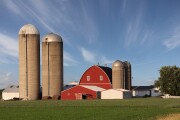
WASHINGTON — As Capitol Hill once again stares down the possibility of a spending standoff and potential government shutdown, lawmakers are also negotiating another large piece of must-pass legislation that affects many banks: the farm bill.
Agriculture bankers and rural financial institutions benefit from crop insurance, which guarantees farmers a base price for their products. That coverage, in turn, means that those farmers' lenders can safely assume they will get paid. Farming can be a capital-intensive and risky industry, so the farm bill — one of the largest spending bills and the legislative basis for programs like crop insurance and food assistance — is meant to stabilize the ag industry.
"If there's a golden nugget for bankers, it's the continuation of the federal crop insurance program," said John Blanchfield, principal at Agricultural Banking Advisory Services and a former senior vice president at the American Bankers Association. "It provides two flavors of income security to the farmer, and therefore his or her banker. Flavor one is the protection against weather-related damages — that's the traditional product. And the second is income protection, where a farmer may buy a floor price for their crop, and by doing so, the farmer has income certainty and the bank has repayment certainty."
The farm bill is meant to be negotiated every five years. This year, farmers and their bankers have to deal with a strong new group of conservative lawmakers who, angered by the expansion of federal spending during the pandemic, are looking to cut federal appropriations and
The current funding for the farm bill expires at the end of September, but experts estimate that lawmakers aren't far enough along in negotiations to pass another five-year bill by Sept. 30. Instead, those experts anticipate a shorter-term solution, possibly a one-year renewal.
"Realistically, looking at where we are, it's extremely unlikely that we get a farm bill by the time it expires at the end of the fiscal year," said Nan Swift, a fellow at lobbying firm R Street who focuses on the bill. "Given the threat of a shutdown, it's hard to see where the momentum will be or where we'll have the time necessary on [the House or Senate] floor."
Still, Swift said that it's not unusual for ag legislation to get a one-year or six-month extension, and that most of the programs that rely on the farm bill could continue for several more months.
"Things can keep going on autopilot for a while, and a lot is mandatory spending," she said. "However, once we hit January and some programs start to expire, then we do have a problem."
Banking groups have been pressing lawmakers to finish negotiations on the legislation. In addition to crop insurance, bank groups say that they engage with Congress on issues related to lending guaranteed by the Farm Service Agency, which might be expanded in the new bill.
"This is a tremendously important bill to banks of all sizes and to the farmers, ranchers and other bank clients who depend on agricultural credit in communities across the country," said Kirsten Sutton, executive vice president of congressional relations and legislative affairs at the ABA. "We have been working with our members and with key partners on Capitol Hill to advance priorities in the farm bill, including increased loan limits for FSA-guaranteed loan programs and key reforms to help young, beginning and underserved farmers and ranchers."
The ABA wants FSA loan limits for guaranteed farm ownership to increase to at least $3 million to account for rising land prices — up from the current $1.75 million. The trade group also said that FSA-guaranteed farm operating loans should go up to at least $2.5 million from $1.75 million, also to account for rising costs.
Similarly, Mark Scanlan, senior vice president of agriculture and rural policy at the Independent Community Bankers of America, said that the group is "supporting a number of enhancements to [the U.S. Department of Agriculture's] guaranteed-loan programs such as raising loan limits" to keep up with inflation.
However, Scanlan cautioned that ICBA would be concerned about "significant expansion of USDA's direct lending, as it could undermine banks' ability to extend credit to borrowers."
The ICBA also supports the adoption of a USDA express loan, which Scanlan said would be similar to the Small Business Administration's express loan and would provide lenders with a quick, three-day decisions on loan applications if the lender would take more of a risk by accepting lower guarantee amounts for loans up to $1 million.
The ICBA is advocating against expanding the powers of the Farm Credit System, opposing broad approval authorities for nonfarm lending by the government-sponsored enterprise, which the trade group for community banks said could undercut their members by shrinking banks' loan portfolios.
Although banks are advocating for some specific changes to government lending programs, the biggest concern for farmers and their lenders is still that crop insurance is renewed without complication, said Ernie Goss, director of the Institute for Economic Inquiry and a professor of economics at Creighton University's Heider College of Business. He said that banks are already noticing a decrease in economic activity from farmers as they try to deal with increasingly severe weather events such as floods and droughts.
Goss said the question of whether the farm bill becomes the center of yet another political fracas adds another layer of uncertainty to an industry that, for its workers, is already unpredictable.
"So it just reminds the farmer that now has to deal with the drought and other conditions, and you have to deal with the unknown of who gets elected next year, and that just introduces another element of uncertainty," he said. "And what does that do for the farmer? It makes them less cautious, and less likely to purchase equipment or make other purchases."






